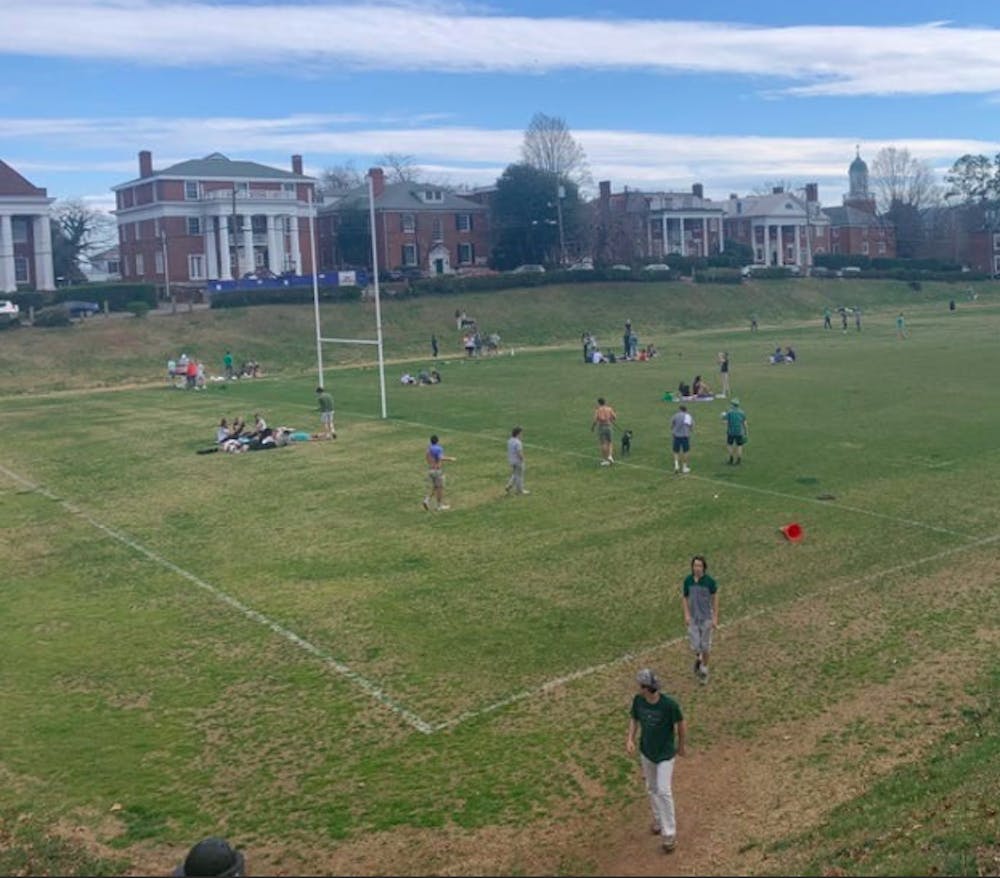The world has changed forever. The ways in which we once lived our lives have been permanently impacted by COVID-19’s spread. The educational, economic and healthcare patterns that dominate so many American lives now suffer instability with the rise of this disease. However, one of the most disorienting things about this change is its current subtlety for most Americans. While the fiber of everything we know implodes, everyday life seems eerily the same. The sun rises. I wake up the person I was the night before. I eat and work and function like myself. For now, the dramatic changes facing humanity rest in the background of my consciousness. I do not yet know anyone with the virus — but I know that will not be the case for long.
As I left Grounds for spring break, I was almost certain I would return. However, just a few days later, the University canceled classes and urged students to stay home. Now, drastic measures like “shelter in place” orders and other lockdowns are now common across the country. While I am sure many want hope right now, that hope cannot come at the expense of reason. We may hope that the world we live in after coronavirus is habitable, but there is no hope that we will return to the world we left behind a few weeks ago. While estimates from public health officials vary — from thousands to millions of deaths — there is clear evidence that this virus is incredibly serious, and a poor reaction could cost a staggering number of lives. The rhythms of life we knew are gone.
This change is difficult to comprehend, and I genuinely understand the urge to ignore dangers rather than face the lonely, often bleak world of social distancing. However, when young people — and others who are not as likely to develop severe cases of the virus — behave irresponsibly, they prevent their own discomfort at the expense of many lives, very often their own. The last time this kind of traumatic change happened in America was after the attacks of September 11th — an event that few students at the University even remember. Further, a pandemic on this scale has not happened in recent memory — the closest past example was Spanish Flu in 1918, but even that existed in a world so scientifically different from our own that it is difficult to serve as an adequate comparison.
There is no guarantee that this will be the last time we are confined to our homes with schools closed and stores shuttered. In fact, it is wholly possible that the virus will become seasonal — reoccurring and deadly even with a vaccine. We are wading into unknown waters — looking into a future in which the safety of a first-world lifestyle no longer protects us from infectious disease, where large gatherings are now suspect and where a cough is not simply just a cough.
Unfortunately, far too many people refuse to see the startling urgency of this situation. Despite the University’s warnings, students were reportedly partying in Charlottesville earlier this month, and students across America have been congregating with friends, flocking to the few businesses still open and gathering on beaches using newly cheap plane tickets. The irresponsibility of these actions is startling. While not everyone has the ability — be it healthcare or service industry workers or our nation’s poor — to social distance, those who unnecessarily put others at risk may have blood on their hands. Further, young people are not immune — not from COVID-19, not from death and not from lifelong lung damage. Even if young people are at reduced risk, the selfishness of those who refuse to change their lifestyles is repugnant.
I do not want to be grim, but I also do not want to fall into the “everything is fine” mentality I see around me — the posts about recovery rates or complaints that for most the virus is just a flu. These are just appeals to optimism that undermine real danger. There will come a time for such optimism, but that time is not now. If we are to prevent the deaths of millions of people, we need to panic. We need to be afraid. We need to get used to the idea that our world will never be the same.
The one thing separating the responsible and the reckless is fear. Fear is one of the most valuable emotions humans are capable of. It protects us — and if we are empathetic, it protects others as well. I am afraid. But that fear pushes me to remain inside. I disinfect packages and mail, wash my hands regularly and vigorously and exercise in the backyard. I am afraid, but that fear could very well save my life and the lives of those around me.
For those behaving recklessly — I want you to be afraid. I want nothing more than for you to feel the kind of fear that makes you isolate inside your homes and wash your hands. I want you to look at the world around you, and know that it has changed radically and forever, even if you cannot see it yet — and I want you to know that your actions have real and tangible power to prevent suffering, as well as create it.
Emma Camp is a Viewpoint Writer for The Cavalier Daily. She can be reached at opinion@cavalierdaily.com.
The opinions expressed in this column are not necessarily those of The Cavalier Daily. Columns represent the views of the authors alone.







